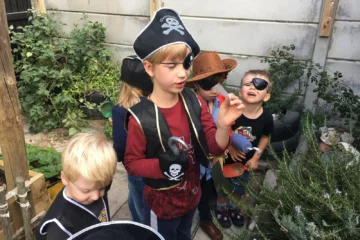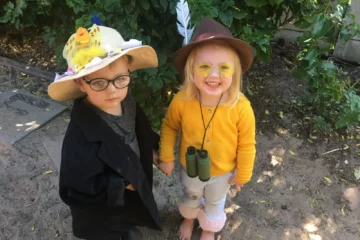“Early Childhood education is the key to the betterment of society.” – Maria Montessori
This month we will be talking about the topic of school. Many parents are looking for a school for their children at this time of the year. Some are first-time parents and the task at hand seems overwhelming. Others have had good and not that good experiences and are looking for something new or a better fit for their child.
I too, was once a first-time parent looking for a school for my little daughter who was at the time 3 years old. I hadn’t really given schools much thought at the time as she was only 3. I heard my colleagues and friends talking about their little ones attending school. I had no previous experience when it came to schools so I did what many parents do I went on their recommendations instead of asking myself some valuable questions.
The result was not good. I placed my daughter in the school my colleague’s children were going to. It was a large school with many children attending daily and many classes of different age groups. I would drop my daughter off at 07h15 just before I went to work and fetch her at lunchtime. I found that she would cry and hang on to me in the morning which made drop-off time a nightmare. She clearly did not want to go. A colleague informed me that she noticed that my little daughter would still be sitting at the front entrance at 9h00 in the morning after I had dropped her off earlier that morning. I also noticed that when I fetched her she would always be sitting in wet panties. Something clearly was not right here. I decided to check if she was sitting at the front entrance all day. This could not be safe and was not acceptable to me either.
The next day I dropped her off as usual. Then I waited to see what happened next. Yes, there was my little daughter still sitting by the front entrance at 09h00. Unattended and clearly none of the staff at the daycare cared about her or even noticed her they were too busy elsewhere. When I called the principal to find out why this was happening she didn’t even recognise that I was the mother of this little girl sitting at the entrance. After 2 weeks of attendance, I withdrew my little daughter from this school. This definitely was not what I was expecting or looking for in a school. Did this first experience with a school matter? Yes, it did. When I mentioned school my little one did not want to talk about going again. It took me another 9 months to settle my daughter from this uncomfortable experience in order to send her to a new school.
What I learned from the experience is that it is best to ask important questions first for yourself before starting to look for a school for your child. When you know what is important to you and your child it is easy to find it in a school. Nothing beats a personal touch, that you and your child matter and are valued. I went out and looked for a school that matched what I was looking for, for my daughter and I found just that. I enrolled her in a small school setting (15 children in the school) where the teacher focused on individual attention. We received personal attention and feedback. My daughter made wonderful friends and thus loved going to school. She excelled at everything she was learning. She loved her teacher. Her teacher was an experienced teacher and I could have wonderful conversations with her about my concerns. She was a well of sound information when it came to children. I could see she loved children and understood their needs. My daughter felt safe, secure and comfortable in her new environment. She was able to start school slowly 2 days a week which led up to an everyday attendance. She was at last happy; what a pleasure.
Knowing what is important to you and your child matters. Finding the school that best fits your needs will be a blessing. A child that is happy and excited to get to school every day makes all the difference. Having insight and answering a few questions can make finding what you are looking for so much easier. Here are the questions I asked myself, I have elaborated under each question to bring insights, understanding and clarity. I know they will guide you in the right direction.
What is your child’s personality?
Knowing your child’s personality and character is important when choosing a school. Children that are emotionally sensitive prefer smaller schools. They are less intimidating and not so noisy. Noise and too much activity can be easily overwhelming. Being overwhelmed can be very unsettling for a child and makes adjustments more challenging. An environment that is smaller makes a child naturally feel safe. It also gives emotionally sensitive children the opportunity to learn about their emotions in a smaller more relaxed environment. If your child struggles with certain activities or mastering skills like cutting with a scissor, pasting with glue, or pencil grip the individual attention of a smaller school will be of much-needed support to your child and will benefit them later.
Is your child an extrovert or an introvert?
Do they love plenty of children and activities or do they prefer quieter more one on one relationships?
Smaller environments allow a child to grow within themselves learning about themselves and their classmates. It is a gentle approach to school.
Is your child strong-willed or do they easily lose focus and become distracted?
Then a small school with an experienced teacher will help give you the support and guidance
you need.
How old is your child?
The age of your child is important to consider. 18 months to 3 years are better suited to smaller environments as they are less overwhelming, especially when starting school for the first time. They will receive individual care and can attend school 2/3 times a week at the beginning, which is the best way to begin school. Older children 3 to 6 years need a stimulating program to keep them curious, asking questions and providing plenty of learning opportunities and playtime. In this type of
environment, children learn to love learning and this lasts a lifetime. That is a bonus for any child. Learning needs to be fun and there needs to be plenty of playtime in the early years of development.
A good age for a child to start attending school is around 18 months when they start noticing other children and wanting extra stimuli. Starting slowly is the key.
Childhood: According to Marie Montessori, the first 6 years of a child’s life are the most important years. They are the developing years where habits, patterns and a firm foundation are formed upon which the child will continue to build. It is the time when children learn the most, they are like little sponges absorbing their environments using all their senses to fully take in their experiences. Children learn through imitation and play.
Does environment count?
Yes, it does count. Therefore a safe, tidy and organised environment, with a warm, friendly atmosphere and enough equipment that creates a space for children to play and learn is vital. It gives children the opportunity to experience their world. Children that are safe and happy thrive and stay healthy.
Outdoor play and a beautiful garden filled with trees, flowers and pets to take care of are valuable for children at this age.
What is your child going to learn every day?
It is important that the school follows a learning program, filled with themes, songs, stories and creative activities. Where possible the school takes children on outings to experience what they are learning. Children learn through imitation therefore it is important that the people and the
environment your child is in all day are giving them value and they are learning important life skills. Children are also learning language and social skills from their environment. Children at this age spend a great deal of time observing and processing information before they attempt something. Children understand that the actions they are imitating have significance. Children imitate those around them as it creates an instant connection. Imitation is a process of steps namely watching, listening, processing, attempting to copy the behaviour and practising.
Principal, teacher and caregiver?
Teachers and caregivers provide a firm foundation and stability. Forming a bond with your child’s teacher is important as you will receive all the support you and your child need.
Do my child and me, connect with the caregivers and teachers at the school?
Are they qualified? Do they have years of experience? Do they have a First Aid Certificate in case of an emergency? When was the school established?
These are important questions to ask as an experienced teacher can offer you support,
guidelines and tips.
In conclusion, choosing a school for your child is an important decision to make. Spend some time asking yourself these questions and become clear about what is important to you and for your child.
The first experience of school will have a lasting effect on your child. Choose wisely and make wonderful memories.
“The education of even a small child, therefore, does not aim at preparing him for
school, but FOR LIFE.” – Maria Montessori


